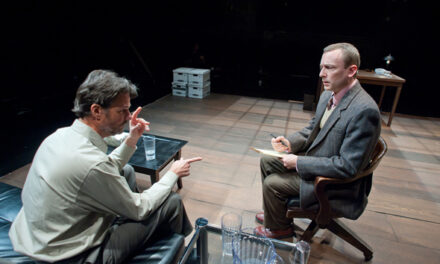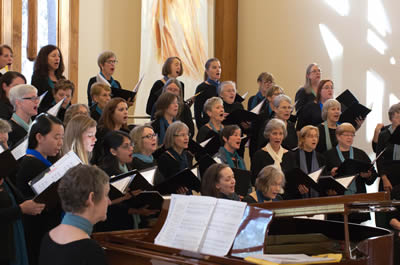Since its formation in 1951, the Greensboro Oratorio Singers has been a non-audition volunteer group dedicated to learning and performing a wide range of choral literature and to developing musical talent and musical appreciation. The GOS sponsors an annual scholarship program for high school students studying classical music. Its annual season includes three major concerts: the presentation of a major work in the spring and in the fall and the annual Messiah performance in December. The GOS brings music to local retirement communities. Concerts are given free but donations are suggested.
The spring concert, given at Peace United Church of Christ, featured a small twenty-one member chamber choir, led by Jay O. Lambeth and accompanied by Bob Winsor on an upright piano. Both the choir and treble-sized audience were broadly representative of the community’s demographics.
The Mass No. 2 in G, D. 167 by Franz Schubert (1797-1828), was composed over the course of a week in 1815. It was an unhappy year for the composer; his voice had changed so he had to leave the imperial choirboy school. After he had finished a brief teacher training program, he began teaching in his father’s school, a job he loathed. Despite his travails he still managed to compose 145 art songs, two symphonies, a string quartet, two piano sonatas, and other works for the piano! The mass is simple and tuneful with the voices moving in homophonic style through the syllables of text. The scoring is more vigorous than in the first mass and there is a keener awareness of the sense of the liturgy. Schubert freely adapts and modifies the traditional texts and there is a sense of the liturgy being “shoe-horned” to fit the musical accompaniment. The original score called for strings and organ. He added optional parts for trumpets and timpani later and his brother, Ferdinand added bassoon and oboe parts in the 1840s. Mass No. 2 consists of six parts: Kyrie Eleison, Gloria in Excelsis, Credo, Sanctus, Benedictus, and Agnus Dei.
I was astonished as I realized the GOS was performing Mass No. 2 in English instead of the original Latin. I had never heard a mass sung in the vernacular in all my years of going to concerts and had no base against which to judge it. A consistent virtue of the choir was the clarity of the text. This was aided by Schubert’s very simple setting of the text without any complex juxtaposition of musical lines or fugues. Five choir members were featured as soloists or in duets or trios. Words were always clear even if the singers were sometimes more earnest than precise in their intonation. I particularly liked the fervent Gloria.
The small rustic Kirk I grew up in featured an un-tuned upright piano that only the deaf Beethoven or perhaps Charles Ives’ iconoclast father could have loved. Years of its loud banging have made me cringe at the very sight of an upright. Hence I have plenty of praise for the musical skill and taste of the GOS’ accompanist Bob Winsor for the quality of his support for the choir.
The American Mass by Ron Kean proved to be a pleasant discovery. The composer will retire July 1, 2013 as Director of Choral Activities and outgoing Faculty Diversity Chair at Bakersfield College in Bakersfield, California (1994-2013). He is also the former Chair of Performing Arts there. He pioneered multicultural choral music studies and techniques for teaching it. His lovely American Mass weaves American hymns and spirituals into the traditional Latin liturgy. It is in four parts. The Kyrie Eleison contains the African American spiritual “Let Us Break Bread Together.” Robert Robinson’s hymn “Come Thou Fount” is integrated within the Gloria. The Sanctus interweaves the well-known “Swing Low, Sweet Chariot.” The Angus Dei contains “Shall We Gather at the River,” words and music by Reverend Robert Lowry.
Clarity of the text was the main feature of the GOS’s performance. It was good to hear them do equally well with the traditional Latin as they did with the English. This is a reflection of director Jay Lambeth’s preparation. The soloists from within the choir did a solid job.












